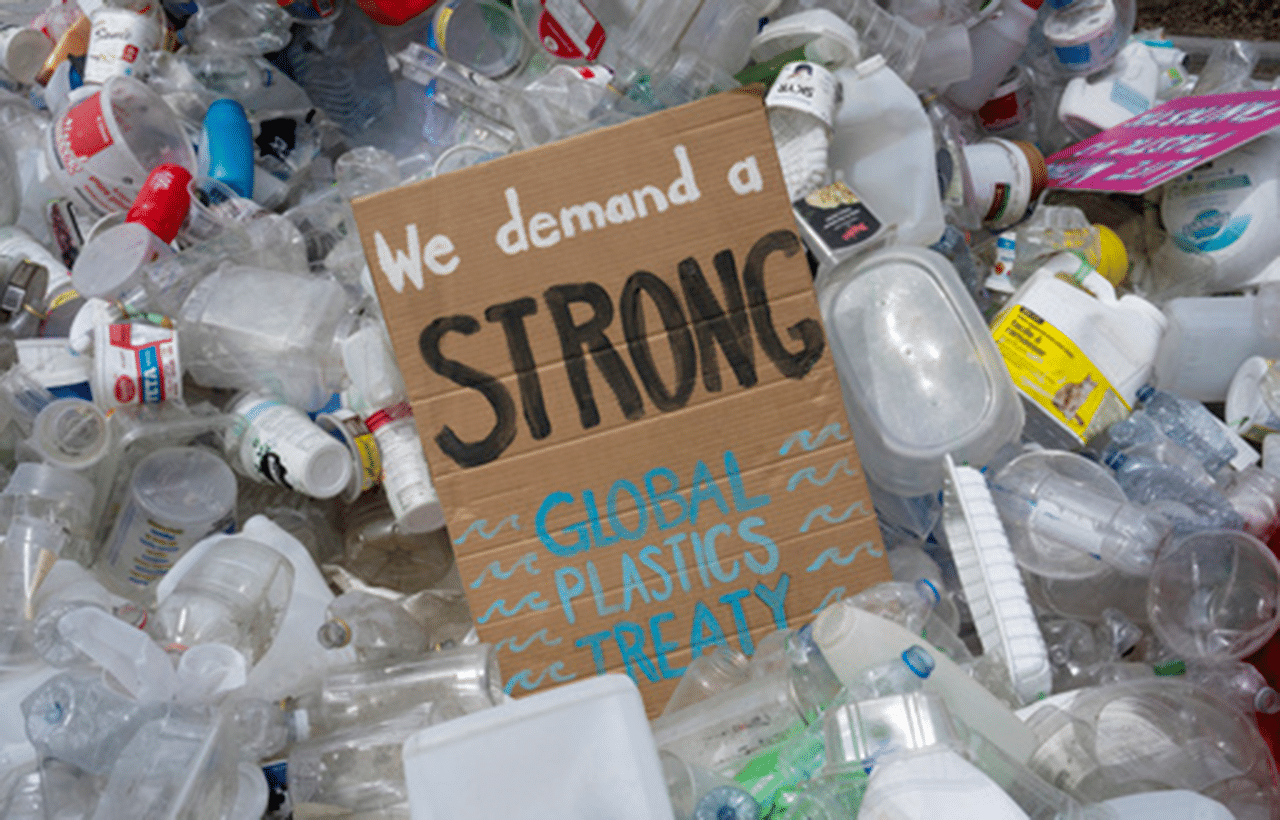

FILE PHOTO: A sign sits amongst plastic on a public art installation outside a United Nations conference on plastics on April 23, 2024, in Ottawa, Ontario. (Adrian Wyld/The Canadian Press via Associated Press, File)
LOS ANGELES — Los Angeles County is taking on Pepsi and Coke for their role in plastic pollution.
In a lawsuit filed Wednesday, the county alleged PepsiCo and Coca-Cola companies have misled the public about the recyclability of their plastic bottles and downplayed the negative environmental and health impacts of plastic disposal.
Article continues after this advertisement“Coke and Pepsi need to stop the deception and take responsibility for the plastic pollution problems your products are causing,” Los Angeles County supervisor Lindsey Horvath said in a statement. “Los Angeles County will continue to address the serious environmental impacts caused by companies engaging in misleading and unfair business practices.”
FEATURED STORIES GLOBALNATION US nuclear bomber joins air drill with South Korea, Japan GLOBALNATION 13 Chinese nationals nabbed for illegal mining GLOBALNATION Northern Gaza's hospitals come under attack againCoca-Cola owns brands like Dasani, Fanta, Sprite, Vitamin Water, and Smartwater, while PepsiCo owns Gatorade, Aquafina, Mountain Dew, and more. The two companies have been ranked as the world’s top plastic polluters for five consecutive years, and Coca-Cola has taken the number one spot for six years, according to global environmental group Break Free From Plastic.
PepsiCo produces approximately 2.5 million metric tons of plastic and Coca-Cola produces approximately 3.224 million metric tons of plastic annually, according to Break Free from Plastic.
Article continues after this advertisementREAD: To tackle plastic scourge, PH makes companies pay
Article continues after this advertisementA European Union consumer protection group and environmental organizations filed a legal complaint against Coca-Cola, Nestle, and Danone last November, accusing them of being misleading when representing packaging as 100 percent recycled or 100 percent recyclable.
Article continues after this advertisementThe Los Angeles County lawsuit said Coca-Cola and PepsiCo have employed “disinformation campaigns” for consumers to purchase single-use plastic, believing them to be recyclable and less harmful to the environment.
It alleged that both companies promised to create a “circular economy” for its bottles, in which plastic bottles can be recycled and reused an endless number of times, while in reality plastic bottles can only be recycled once, if at all.
Article continues after this advertisementThe American Beverage Association, which PepsiCo and Coca-Cola are a part of, denied the lawsuit’s accusations about their plastic bottle recycling labels.
“The allegation that our packaging is not and will not be recycled is simply not true,” the group’s spokesperson William Dermody said in a statement.
Dermody said California had a 71 percent bottle recycling rate in 2023, one of the highest in the country, and that their bottles are “designed to be recycled and remade and can include up to 100% recycled plastic.”
In 2022 alone, an estimated 121,324 to 179,656 tons of plastic waste leaked into the land and ocean in California, and plastics make up seven of the top 10 litter products found on beaches, the lawsuit states.
A big part of the problem is microplastics.
READ: Microplastics detected in human brain tissue – study
Plastics that have leaked into the environment eventually disintegrate into tiny pieces of plastic measuring five millimeters or less. They can affect soil and plant growth, marine and fish life, and are nearly impossible to remove from the environment, the lawsuit states.
Some Australian researchers, on behalf of the World Wildlife Fund, calculated in 2019 that many people each week consume roughly 5 grams of plastic from common food and beverages, and microplastics have been found in body tissues and organs. Though research is still limited overall, there are growing concerns that microplastics in the body could potentially be linked to heart disease, Alzheimer’s and dementia, and other problems.
The lawsuit is seeking a court order to stop the companies’ “unfair and deceptive business practices” as well as restitution for consumers and civil penalties of up to $2,500 per violation.
In February 2020, environmental nonprofit Earth Island Institute filed a lawsuit in California asking for damages and an order for Coca-Cola, PepsiCo, Nestle USA, Procter & Gamble, and six other companies to clean up the plastic waste they should be held responsible for.
Subscribe to our daily newsletter
New York state also sued PepsiCo last November for its role in creating the plastic waste that littering the Buffalo River, which empties into Lake Erie and supplies the city of Buffalo’s drinking water. A judge dismissed the case Thursdaymoney play, stating in a court filing that there was no “failure to warn” the public on plastic-related dangers and that there was no cause of action to punish the companies for the actions of a third party — people who litter.
READ NEXT ‘Pogo hub’ in Bataan seems into ‘black marke... Germany to close Iranian consulates over execution EDITORS' PICK Marcos signs laws creating new court branches across PH Angelica Lopez is ‘Pearl of the Orient Seas’ in Miss International 2024 Northern Gaza’s hospitals come under attack again MUPH rallies support for Chelsea Manalo in Miss Universe 2024 polls Tropical depression may enter PAR on Nov. 4 Poverty incidence in Central Visayas drops in 2023 MOST READ Marcos, BARMM leaders discuss collaboration for 2025 elections LPA seen outside PAR, chance of becoming a typhoon is low Marcos declares Nov. 4 ‘Day of National Mourning’ PBA Finals: Ginebra dominates TNT in Game 4 to tie series at 2-2 Follow @FMangosingINQ on Twitter --> View comments